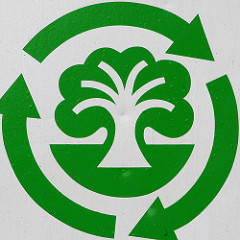clear
Should the UK be doing more to encourage recycling?
clear

source:
Leo Reynolds / Flickr
The UK is doing well with encouraging people to recycle in their everyday lives, but I think so much more could be done. Introducing the 5p charge for carrier bags was a nationwide implementation reducing the amount of plastic going into waste by a phenomenal amount. It was a brilliant move, and more schemes like this need to be done. But one initial focus should be increasing the amount and variety of materials which can be collected from the house.
At this point in time, different county and local councils have different rules for what can and can't be collected - for example some areas accept glass in the household recycling bins and some don't. Why should certain areas not be allowed to recycle glass at the home. By not collecting the glass, this reduces the likelihood that residents in these areas will recycle this material - and instead it will make its way to the general wastebin, and into landfill.
The UK is introducing more schemes, but by making it easier for the public to recycle recyclable material in their homes, there would be more of a shift in the public mind that recycling is important.
 0
0
clear
Lately in accordance with the EU Waste Framework Directive, the UK is required to meet an EU target of recycling a minimum of 50% (by weight) of its household waste by 2020. Recycling rates have increased markedly since 2000 but concerns have been raised in recent years that household recycling rates have started to plateau. Actually the UK Waste policy is devolved. This note discusses trends and policy in England, Wales, Scotland and Northern Ireland. UK has a number of recycling industry associations including British Metals Recycling Association (BMRA), Textile Recycling Association (TRA), Oil Recycling Association (ORA), the Industry Council for Electronic Equipment Recycling (ICER), The Organics Recycling Group (ORG), The United Kingdom Cartridge Remanufacturers Association (UKCRA), The Environmental Services Association (ESA), British Plastics Federation (BPF) etc. The BMRA represents 340 UK metal recycling businesses involved in the £5.6 billion UK metal recycling industry. BPF, established in 1933, has more than 400 members across plastics recycling industry including plastics processors, recyclers, and end users.
 0
0
clear
 Wafa Benizid
6 years, 11 months ago
Wafa Benizid
6 years, 11 months ago
In the area of London I live in, putting out the recycling is very simple - everything you'd expect is recycled and there is no need to separate it - it just goes into the same big bin. However, even though it is so easy not everyone does it. One reason is that it is rumoured that the waste is not always recycled by the council. As well as this, the use of energy needed to recycle is nearly he same as making things from raw materials. If there were more ways to re-use containers - ie more items sold loose and weighed it would be better. And manufacturers should reduce packaging. Many items seem to come on a plastic tray or plastic pot, then with a cardboard sleeve as well - totally unnecessary. Banning plastic items like disposable cutlery or drinking straws would be a good step too.
 0
0
clear
The Uk try as much as possible to encourage recycling, with many signs up in the streets. Whether or not people follow the signs is up to them. The government can't control people, but they can make them aware of what they are doing.
 0
0
clear

Sign up to post or vote on answers.
Improveo will help systemize your knowledge.